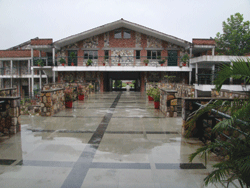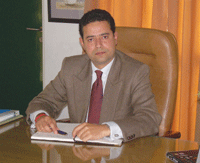Promoted in the millennium year with the objective of building an institution of excellence rooted in Indian academic traditions while preparing students for the future, SWS is all set to take wing
 Spread over 50 acres, landscaped to blend harmoniously with its green environment and offering vistas of the distant Himalayas, the SelaQui World School (SWS) was promoted in the millennium year (2000) by Om Pathak, a former civil servant and incumbent vice-chancellor of the DPS Ghaziabad Society, former member of the governing board of the Colvin Taluqadar College and La Martiniere College (Lucknow) and co-founder of the Institute of Management Technology (Ghaziabad), under the aegis of the Gurukul Trust. Currently the CISCE and IBO affiliated school has 250 students in classes V-XII instructed by 35 teachers supported by 150 staff.
Spread over 50 acres, landscaped to blend harmoniously with its green environment and offering vistas of the distant Himalayas, the SelaQui World School (SWS) was promoted in the millennium year (2000) by Om Pathak, a former civil servant and incumbent vice-chancellor of the DPS Ghaziabad Society, former member of the governing board of the Colvin Taluqadar College and La Martiniere College (Lucknow) and co-founder of the Institute of Management Technology (Ghaziabad), under the aegis of the Gurukul Trust. Currently the CISCE and IBO affiliated school has 250 students in classes V-XII instructed by 35 teachers supported by 150 staff.
“The SelaQui World School was established in the millennium year with the mission to create an institution of excellence integrating knowledge and learning into a continuous process to develop responsible citizens who will strive to build a better world. From the start our objective was to build an institution which would be rooted in Indian academic traditions while preparing students for the future. Therefore we offer holistic secondary education which encourages learning by enquiry, exploration and experience and through mastering latest ICT (information communication technologies). Our goal is to enable our students to cope with life in its crests and troughs and strive for success, unbowed by failure,” says Rohit Pathak, alumnus of DPS RK Puram (Delhi), Thapar Institute of Engineering and Technology (Patiala) and LeHigh University (Pennsylvania), who worked for a while with Daewoo Motors and USSC Group Inc as a quality control engineer before taking charge as headmaster of the school in 2006.
According to Pathak, the SWS management is committed to the philosophy of teachers functioning as facilitators utilising new information communication technologies to motivate students to explore the world of knowledge independently. While the school closes every winter for 12 weeks, teachers are given only eight weeks leave. For four weeks every year, the school runs an ICT-intensive teacher training programme to continuously re-align subject content and pedagogy. The school’s top management is also fully committed to students using technology to enable them to improve their subject knowledge and comprehension. Every classroom is fully equipped with learning aids for specific subjects in addition to video screens, LCD projectors and networked computer terminals. A rich digital library of 350 resources (music and educational CDs and DVDs, encyclopaedias and documentaries) supplements a conventional library with 5,000 volumes and 10 journal subscriptions.
Sports form an integral part of the SWS curriculum. On offer is a cricket, hockey and softball ground along with two football fields, horse riding arena, swimming pool and four tennis courts including two synthetic, all-weather courts. Moreover with the help of the well-known IT transnational Cisco Systems, a ‘virtual school’ will soon become operational on the SWS website providing interactive 24/7 access to parents to update themselves about academics, sports, health and general progress of their children.
Furthermore, given the school’s pupil-teacher ratio of 1:8 and maximum permitted classroom strength of 25, every child receives individualised attention. Sensitisation to environ-mental issues has also been made an integral part of the curriculum. “Trekking, climbing and hiking programmes, activities such as gardening, and bird watching, hobby classes covering sculpture, music, dance, art and theatre coupled with a wide range of sports facilities and a RaP (reflection and planning) session at the end of every week, where students meet under the guidance of faculty members to reflect upon their learning and planning for the week ahead, distinguishes SWS from other residential schools,” says Pathak.
The SWS management especially prides itself for combining its 21st century ICT-enabled curriculum with India’s ancient academic and cultural heritage. The school’s guiding philosophy is that its students can develop holistically only if the environment in which they live and study is the outcome of genuine collaboration between students, teachers, parents and the local community. Therefore it has drawn up plans to establish a high-quality associated day school to provide education to children of the local community.
 Eight years on, the SWS management believes the school’s period of consolidation is over. “In 2004, 37 students wrote the class X exam of CISCE. Out of these, 19 students got first division with four winning distinction. Since then every year we have improved our board exam results. Last March, 36 of a total of 45 students secured the first division with ten students passing with distinction. In the ISC (class XII) school-leaving exam, the number of students passing in first division has increased from 12 in 2007 to 26 currently. Moreover in the recently introduced IB diploma of the International Baccalaureate Organisation, Geneva, all three class XII students who opted for this curriculum passed with distinction,” says Pathak.
Eight years on, the SWS management believes the school’s period of consolidation is over. “In 2004, 37 students wrote the class X exam of CISCE. Out of these, 19 students got first division with four winning distinction. Since then every year we have improved our board exam results. Last March, 36 of a total of 45 students secured the first division with ten students passing with distinction. In the ISC (class XII) school-leaving exam, the number of students passing in first division has increased from 12 in 2007 to 26 currently. Moreover in the recently introduced IB diploma of the International Baccalaureate Organisation, Geneva, all three class XII students who opted for this curriculum passed with distinction,” says Pathak.
Quite clearly, its teething troubles over, SWS is all set to take wing.
|
Admission & fees
SelaQui World School is an international, co- educational, classes V-XII CISCE/IBO affiliated fully residential school. Admission is open to all classes depending on vacancies from December to August. Interested students have to write an admission test held in December and February. Shortlisted candidates are called for an interview with the headmaster. The school term begins on April 1.
Tuition fees (per year): Rs.2.5-2.8 lakh (inclusive of board, lodging and mess charges)
For further information contact SelaQui World School, Chakrata Road, Dehradun, Uttarakhand. Tel: 09927000585; e-mail: admissions@selaqui.org; website: www.selaqui.org
|
N. Grover (Dehradun)